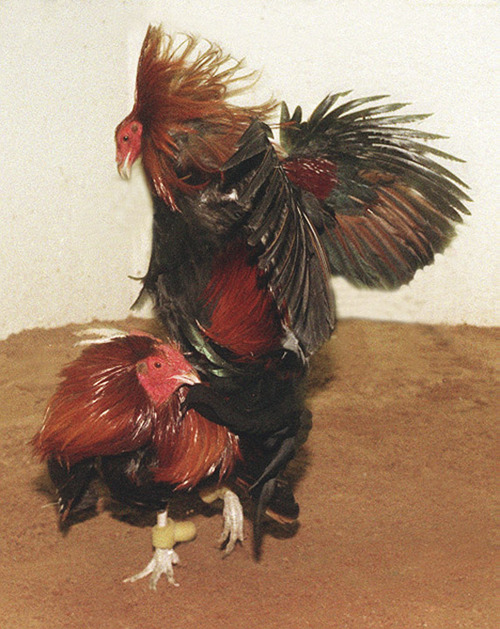This is an archived article that was published on sltrib.com in 2013, and information in the article may be outdated. It is provided only for personal research purposes and may not be reprinted.
With Nevada enacting tougher penalties on cockfighting this month, Utah's looser laws may set the state up to become a haven for cockers and breeders to engage in the illegal sport, Humane Society directors said last week.
But two Utah legislators Friday cued up a fight over penalties after the state House killed a bill last session to toughen the punishment.
Sen. Gene Davis, D-Salt Lake City, said Friday he has pre-filed SB52, word-for-word the same as this year's bill that would have increased the penalty for cockfighting from a misdemeanor to a felony crime.
"It's the same bill that I've asked to be reintroduced next year," Davis said. "If I do any changes in language, it will be with the dogfighting [law] so they're both in consistency."
Sen. Allen Christensen, R-North Ogden, was an outspoken critic of the failed legislation.
Though the sport is already punishable with a maximum $1,000 fine, the bill would make it a felony, subject to up to five years in prison and a $5,000 fine not just to fight but to raise fowl to fight and to engage in derbies.
"I will still oppose it," Christensen said. "I will be a little wiser in the comparison in the penalties for that and certain other things."
Christensen's opposition made headlines in March when he questioned why legislators would toughen laws against cockfighting while abortion remains legal in Utah.
"I don't agree with it, I don't condone it. I simply don't believe that a felony penalty fits the crime," Christensen said.
Utah is surrounded by states that have enacted felony punishment for the sport, which has deep traditional roots in countries in Latin America and the Philippines.
"We don't want Utah to become a magnet for cockfighting just because there's a lot of illegal activities that go along with it, such as gambling and large amounts of money being exchanged," said Gene Baierschmidt, executive director for the Humane Society of Utah.
California also enforces misdemeanor penalties against the sport. But the Golden State has a three-strike penalty for criminals, and it also increased fines for cockers caught at derbies.
Rep. Melvin Brown, R-Coalville, voted against SB52 last session. He said decades ago he was aware of some cockfighting pits in Murray, but that he's not aware of any in the area today.
"My question is: Is it a solution looking for a problem? Or do we have a problem?" Brown asked. "I'm willing to listen to that. If it's a problem, we can talk about it. If it's not ... well, we're wasting our time on it."
The bill would also make it a felony to breed fowl for the purpose of fighting, bringing it in line with penalties against dogfighting. Cockfighting is a felony in 37 states.
Davis said he also heard arguments about individual liberties during the legislative battle.
"There's a guy from Oklahoma that took this on. He called me on the phone and he says, 'George Washington fought cocks,' " Davis said. "He said it's part of our culture.
"It may have been part of our culture back then, but it's not a part of our culture today," Davis said.
John Goodwin, director of animal cruelty for the Humane Society of the United States, said the fight isn't about whether the illegal sport is widespread now, but whether the state's misdemeanor laws would invite outsiders to come to Utah and take the risk.
"Basically we need to have a penalty that is stronger than the gain that comes from breaking the law for it to be effective," Goodwin said.
Christensen said lawmakers have to carefully consider every penalty they put on the books and decide whether it's too harsh for the crime.
"I just feel that, you know, roosters fighting each other, that comes naturally," he said. "Yes, it's enhanced by people. I just don't believe it deserves a felony."



